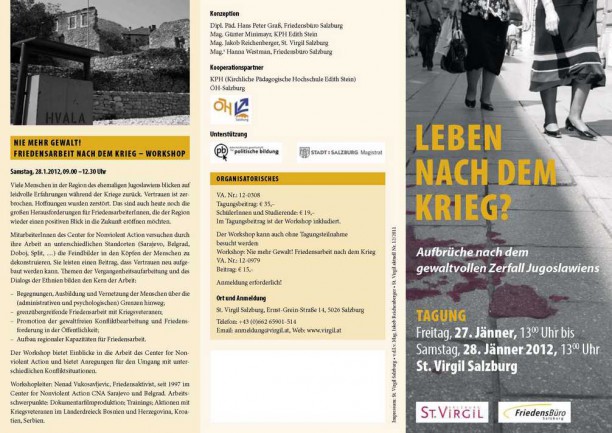In the pleasant ambience of the conference center St. Virgil in Salzburg an exchange of experiences dealing with post-war challenges was held from January 27th to 28th 2012, both for social workers and others who work in Austria and face the impact on consequences of war on the generations of migrants from former Yugoslavia living in Austria, and the migrants themselves, as well as those who deal with matters of war and peacebuilding from academic or activist point of view.
I attended the meeting on behalf of CNA and I was one of the keynote speakers at the first panel with Martina Fischer, PhD (Berghof Research Center-Berlin) and Vedran Džihić, PhD (Professor -Vienna/ Washington). My topic was “truth-justice-reconciliation,” and the main message was that even though complete truth is not possible to achieve, and certainly all of us would have never agreed about what justice is, it does not mean that the work on reconciliation to combat hatred between communities (not as the individual step that everyone may or may not make) should have to wait or should not have to be done.
Personally, I found very interesting Vedran Džihić’s presentation. He brought a dose of personal emotions, talking about his motivation to contribute to the progress of his native country (BiH), from which he escaped as a teenager refugee at the beginning of the war. Then, exposure about experiences in the therapeutic work with traumatized migrants (Michael Schreckeis), which testifies of the degree of trauma that many individuals have been exposed and which can not be overcome after years of living in Austria. The challenges that social workers and teachers are exposed working with children originating from the Balkans and growing up in Austria and who are deeply infected by hate and prejudice, have been the topic of numerous presentations and questions to which answers are sought, and in front of that challenges the powerlessness is felt.
The second day of the conference I had lead the workshop and it involved about 30 people, mixed female migrants and female Austrians, as well as several male Austrians. As one of the organizers of the Peace Office Salzburg well observed, no man from the Balkans was participating…
The workshop lasted about 2 hours and there was a moderated discussion that has provoked a dialogue between participants, particularly migrant women from different ethnic communities. With a lot of emotions, but also a lot of good will and intentions, it seems to me that it was a step toward much-needed dialogue between adult migrants, which is probably the key for solving the problems that their children absorbed and with whom they live. It is interesting and it was nice to see that The Peace Bureau Salzburg is apparently successful in motivating young people to become involved as a peace-activists. There were lots of young people moved with this topic and they were full of energy and will to work.
In the second part of the morning session we watched Nedžad Horozović’s film “Veterans Visits,” which partly caused tears among the people from our region and the compassion of others. As the talking about the film and the issues that derive from it was anticipated after the film, I found interesting that the first person who spoke said that the film is very emotional and difficult, and perhaps it would be good to raise some other issues, and to get back to the impressions of the film when emotions settle … I expected someone to contradict, but it did not happen.
Participants were very satisfied with the workshop and very impressed with the CNA’s work.
I went down to the dining hall and asked the group of waiters what table is scheduled for the “war never again” conference (instead of the real name “life after the war”) in order to sit down at the right place, and the waiter replied like a shot, “that’s what we all hope for” I was confused for a moment, than I smiled to him and thought “what would the waiter in Belgrade or Sarajevo answer to this question “.
Belgrade, 1/30/2012
Nenad V.
